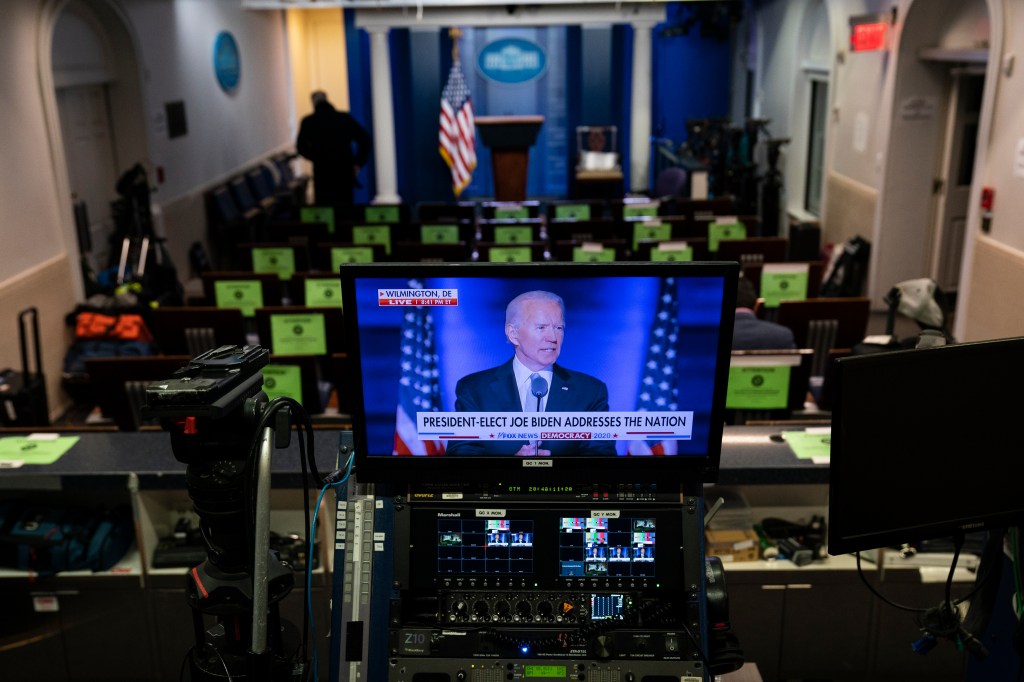In his four years in office, President Trump has made attacking the media a hallmark of his administration. He has called journalists fake news and enemies of the people — but also scum, liars, and bad people. He continues to blame the media for his electoral defeat, accusing journalists of covering his administration unfairly and also of calling the election in favor of Biden.
Trump’s attacks have undermined public trust and damaged American democracy, a particularly troubling legacy in the midst of a pandemic, when the necessary sacrifices Americans will need to make in the coming weeks depend on agreeing on certain essential facts.
But as damaging as Trump’s rhetoric has been in a domestic context, it has been far more damaging for journalists around the world. Tyrants and autocrats have appropriated Trump’s words, denouncing critical journalists and passing new laws criminalizing the publication of fake news. Press conferences featuring Trump and repressive leaders gleefully calling journalists “fake” have become a trope.
During the four years of the Trump administration, CPJ has documented a record number of journalists in prison around the world and a surge in the number jailed for publishing “false news.” The Trump administration has also participated in the cover-up by the Saudi regime of the murder of Washington Post columnist Jamal Khashoggi, protecting Crown Prince Mohamed Bin Salman and blocking efforts by Congress to hold him accountable for his alleged role in the killing.
Reversing this aspect of Trump’s record will not be an easy task for the incoming Biden administration, particularly given the competing priorities. But much is at stake. Standing up for press freedom and defending the rights of journalists around the world is more than a matter of principle — though it certainly is that. It’s also a matter of self-interest, as the U.S. benefits when information flows freely within countries and across borders.
Could the COVID-19 outbreak have been contained if Chinese journalists had been able to report freely on the initial outbreak? Could we develop a more effective global response if we had better data from Egypt, Russia, Brazil, and Iran, all of which are repressing news on the scope of the pandemic? Haven’t American companies and investors long benefited from reporting on China by Hong Kong’s freewheeling press, which is increasingly squeezed by Beijing? Wouldn’t it be helpful for U.S. policy makers and the public to have better access to independent information on political mobilizations in Belarus, Nigeria, and Thailand? Or to understand what’s happening on the ground in northern Ethiopia, where an internal military conflict that has already leapt over the border coincides with a sweeping crackdown on the press?
In order to support journalists working in any of these contexts, the Biden administration must do two things. First, it must improve the press freedom environment at home. Everyone expects Biden to be more respectful of journalists, but the task is much bigger. CPJ was sharply critical of the Obama administration’s record and the Biden administration must do better. It should be genuinely open and transparent; it should protect whistleblowers; it should work to sustain local and regional media; and it should support efforts to tackle misinformation online, not an easy task.
The Biden administration must also make the protection of press freedom an explicit focus of its foreign policy. President Biden should make a major speech about the importance of press freedom, and outline his commitment. The Biden administration should also appoint a Special Presidential Envoy for Press Freedom to represent the administration at a high level wherever journalists are under threat. The Special Envoy should be a one time, non-renewable appointment, and should serve for no more than two years, during which time the State Department should rebuild and strengthen the structures that have traditionally supported press freedom and journalists around the world.
CPJ believes that the Biden administration can restore U.S. press freedom leadership, and in consultation with nearly 40 experts from journalism, law, and the foundation world, we have developed a white paper that outlines the path ahead. We hope that it provides a roadmap for how the U.S. can assume a critical responsibility of standing firmly with those who report the truth — not those who seek to repress it.
